
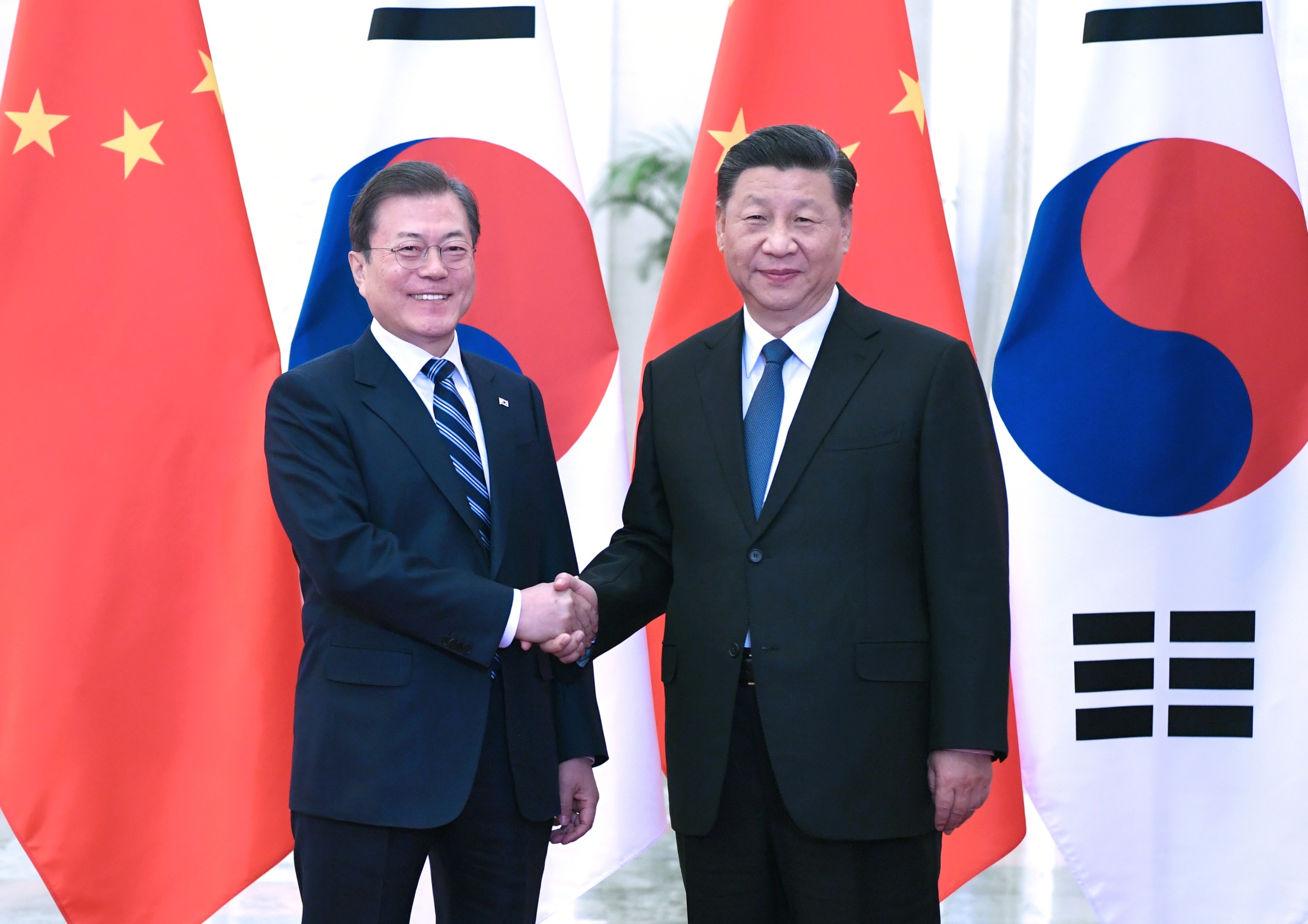 Chairman Xi Jinping meets with President Moon Jae-in
Chairman Xi Jinping meets with President Moon Jae-in
On December 23rd, all the Chinese government control media reported at once that President Moon Jae-in said to Xi Jinping, Chinese President, “All the problems in Hong Kong and Uygur are Chinese domestic issues.” That means Korean president supported Chinese government concerning about the issues of human rights in Uygur and Hong Kong. The Communist Party bulletin reported these contents quickly, and the state-run CCTV reported this in a beginning of the main news. Chinese Ministry of Foreign Affairs also said, “the related content matches the fact”. However, the person concerned of the Blue House said, “the President only said that he had heard the words of Xi Jinping properly”. It means that China edited as if President Moon said the words that Xi Jinping had said, and China distorted the fact. Last month the Blue House flew into a rage for the Japan side in the process of the extension of General Security of Military Information Agreement (GSOMIA), because Japan announced the advantageous contents and said “This is the complete victory for Japan”. And Korea demanded apologies from Japan. The governments including US, UK and Australia, etc. brought up the issue of human rights in Hong Kong and Xinjiang, and their foreign affairs authorities announced the statements, but the Korean Ministry of Foreign Affairs has just watched that until now. A former diplomat in the advanced class said, “I suspect President Moon agreed to the opinion of Xi Jinping virtually”. Shin Beom-cheol, the mayor of the unification center said, “If he remained silent about the international human rights for other purposes, it is the tragedy the Korean Ministry of Foreign Affairs lost the principle of the diplomacy”. |
My Opinion
|
 The present situation of the participation in boycottcampaign of Japanese products
The present situation of the participation in boycottcampaign of Japanese products
After September, 2018, the Japan-Korea relations have been worsened by the judgment of the Korean Supreme Court that demanded the compensation to the so-called ‘wartime laborers’ from Japanese companies. (Korea abandoned the rights about the colony times to claim to Japan in “Japan‐Republic of Korea Basic Relations Treaty” in 1965. On the other hand, Japan performed economic cooperation of 500 million dollars to Korea that is equal to Korean national budget. Article 2 of “Agreement on the Settlement of Problems Concerning Property and Claims and on Economic Co-operation between Japan and the Republic of Korea” writes, “The Contracting Parties confirm that [the] problem concerning property, rights and interests of the two Contracting Parties and their nationals (including juridical persons) and concerning claims between the Contracting Parties and their nationals, including those provided for in Article IV, paragraph (a) of the Treaty of Peace with Japan signed at the city of San Francisco on September 8, 1951, is settled completely and finally.” The Korean government had not clarified the contents of the treaty to the Korean people for a long time, but in 2009 it officially explained the article 2 included unpaid wages of the so-called ‘wartime laborers’.) Since around July, 2019, the boycott campaign of the Japanese products in Korea has spread out around SNS. REALMETER, Korean public opinion poll agency investigated “The present situation of the participation in boycott campaign of Japanese products” since July 10. It shows “I’m participating” increased to 64.4% from 48.0% on July 31. (the graph) On November 28, “I’m participating” was 72.2% and “I’m not participating” was 21.5%. The participation rate exceeded 70% for the first time and it means 70% of overall respondents participate in the boycott now. Korean A (22 years old, woman) who goes to the private university in Seoul participated in the boycott around July, but she did not do that of her own free will, and it was because she was afraid of being left out of her friends. This was the first trip to Japan for her and she said, “I saw a new Japan different from Japan that I had been taught in the class of the history and the news” , and said her image against Japan changed. Still she said that she would not put the photographs on her SNS. “I can have a talk about Japan with the close friends, but after all I am scared that I put it on open SNS.” B (16 years old, man) who goes to a high school in Seoul City talks, “If I had used Japanese products in August, I would have been said ‘Do you use the Japanese product? You are a traitor.’ It was such an atmosphere then.” He says he stopped the boycott and uses the jet stream ball-point pen now and his classmates who started to use the pen made in Korea in August use the products made in Japan commonly now. Korean fast fashion brand SPAO announced the collaboration product with Crayon Shinchan in July, 2017, but was sold out immediately. The boom of Crayon Shinchan pajamas continues afterwards and the copy products are sold a lot. If you walk the downtown such as Myondong or Hongdae, you can still see them at the stalls. “Pokemon, Inuyasha. I thought that they were Korean animations. Because not only sound dubbings but also the names of the characters, the local names and the letters of the signboards were in a Korean style”, said C (22 years old, man) who were crazy about the idol master series recently and were originally an enthusiastic geek of the Japanese animation. There are many Koreans who think Japanese animations are made in Korea and are brought up like C. They are the popular animations such as Crayon Shinchan, slam dunk and excellent detective Conan. It may be said that the Japanese culture penetrates to Korean youths like that. |
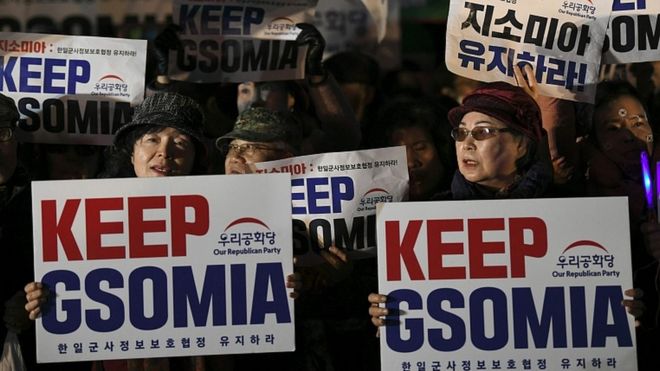 Protesters outside the US embassy in Seoul called for an extension of the pact, known as GSOMIA
Protesters outside the US embassy in Seoul called for an extension of the pact, known as GSOMIA
South Korea says it is to continue a military intelligence-sharing pact with Japan that had been threatened by a long-running dispute. The move was welcomed by the US which had urged the two countries to settle their differences. Seoul announced its decision on Friday, just hours before the pact was due to expire. Tensions between South Korea and Japan go back decades but have recently led to a series of tit-for-tat measures. The tensions have historical roots, and the two countries became embroiled in a deepening trade and diplomatic dispute this year. The intelligence pact, known as GSOMIA (General Security of Military Information Agreement), allowed the two countries to share information about North Korea's military and nuclear activities directly with each other. Without it, information would have had to go through their joint-allies in Washington, slowing the process down. In August, South Korea announced it would terminate the intelligence-sharing agreement and Japan removed South Korea's favoured trade partner status and imposed export controls on its electronics sector. Earlier this month the leaders of the two countries briefly met at a summit in Bangkok, Thailand, to try to resolve their differences. Then on Friday South Korea said it would “conditionally” suspend the expiry, with national security official Kim You-geun confirmed that the GSOMIA would not be allowed to lapse at midnight. He said the Japanese government had “expressed their understanding” but warned that the agreement could still “be terminated at any time”. Japanese Prime Minister Shinzo Abe said bilateral relations were vital and that South Korea had made a “strategic decision” in sticking with the accord. A US State Department spokeswoman welcomed the decision, saying: “This decision sends a positive message that like-minded allies can work through bilateral disputes.” |
My Opinion
|
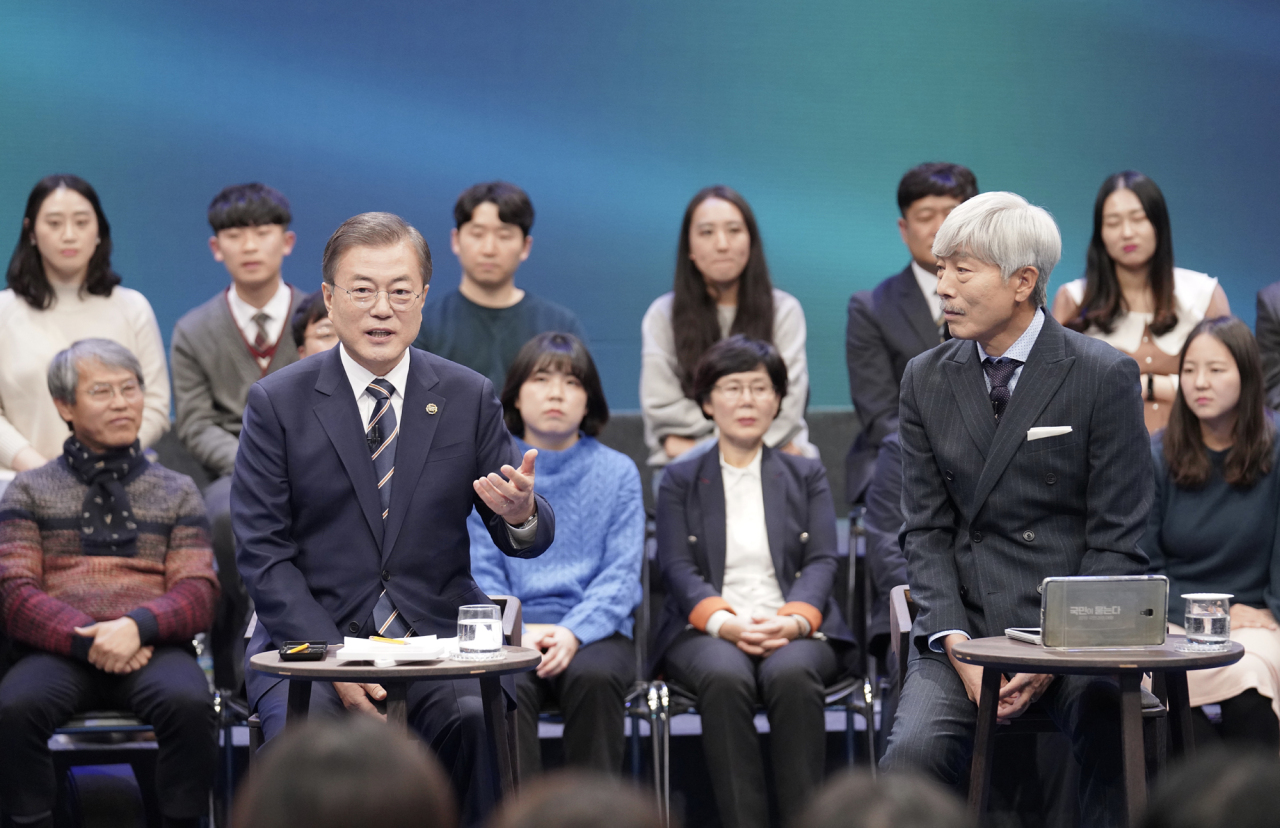 President Moon Jae-in speaks during the televised meeting on Tuesday. Yonhap
President Moon Jae-in speaks during the televised meeting on Tuesday. Yonhap
President Moon Jae-in’s television appearance on Tuesday is being met with mixed reactions from the public and political arena. On Tuesday, Moon took part in an unscripted question-and-answer session televised live on major terrestrial and cable networks. The program invited 300 members of the public -- selected to represent South Korea’s demographics -- to pose any question to the president. Although the program gave members of the public a chance to address the president directly, its format led to the questions being asked in a disorderly manner. Furthermore, some questions were longer than the president’s answers, while others seemed more like expressions of personal opinions than questions. The main opposition Liberty Korea Party called the event a “show for delivering content prepared by Cheong Wa Dae.” “Three hundred members of the public were invited, and (the president) only took questions from about 20, and even those had to listen to the president’s lengthy response to specific questions,” Liberty Korea Party spokesperson Rep. Kim Myung-yeon said. Kim honed in on the president’s response to North Korea-related questions, saying the program forced the public to listen to Moon’s views on “hollow peace.” |
My Opinion
|
 “Anti-Japan Tribalism” - (Lee Young-hoon)
“Anti-Japan Tribalism” - (Lee Young-hoon)
Korean shameful problem to brandish “Anti-Japan Tribalism” - 이영훈 (Li Yeong-hun) I founded the Korean ancient documents society in Korea and acted as chairperson. In 2012 I had a message from the ancient documents investigation team of the Institute of Korean studies. It said, “We’ll investigate a personal museum in Paju city, Gyeonggi Province. Let’s go together. The museum seems to have the document of the comfort women.” I said in a minute, “Yes, I will.” There I found the diaries of 박치근 (Pak Chi-geun) for the first time. It was the diary of approximately 40 years from 1916 to 1957. Pak had run the comfort stations in Singapore and the Burma (Myanmar now). The diaries from 1942 to 1944 were related to the comfort station. Pak ran an inn for war in Taegu, Korea, but it was a comfort station. And he and his wife went to Burma with 20 young women and ran a comfort station for two years. I translated the diaries into the modern Korean. And I held the seminar about the comfort women with the researchers of Nak-seong-dae Economic Research Institute, and studied it for one year. According to the diaries, the comfort women stopped their work, discontinued their business and returned to their hometowns by their own will. Researchers had said before, “the comfort women were slaves and could not come back freely”. It was the opinion of Yoshiaki Yoshimi, Japanese. I took the same opinion, too. However, the documents I found out write that the comfort women went back and forth freely. Suppliers of the comfort women had a hard time to recruit the women. Women came from Indonesia and Sumatra (Indonesia) too. The diaries were concrete. They were not sex slaves, and they had the freedom and the right to return home freely. Why can you say such women were slaves?
The next person is 문옥주 (Mun Ok-ju) . She has her memoirs.
She was treated as a slave though there was the memoirs. This is a lie, too.
|
My Opinion
|
 Kim Jong-un, Chairperson at Korean Workers’ Party inspects
the Myohyangsan medical equipment factory
(Korean Central News Agency)
Kim Jong-un, Chairperson at Korean Workers’ Party inspects
the Myohyangsan medical equipment factory
(Korean Central News Agency)
Korean Central News Agency reported that Kim Jong-un, Chairperson at Korean Workers’ Party inspected the Myohyangsan medical equipment factory in North Pyongan Province. The factory is under renovation. The date and the time are unknown. Kim showed his thumbs up about the general situation, but scolded the cadres concerned with the repair saying they did not play their role enough. Kim pointed out that the outside tiles of the building were not flat. Kim severely criticised them and said, “Why do you do such a work so irresponsibly that I have to come here and take measures?” He directed them to finish necessary work by the end of the year. |
My Opinion
|
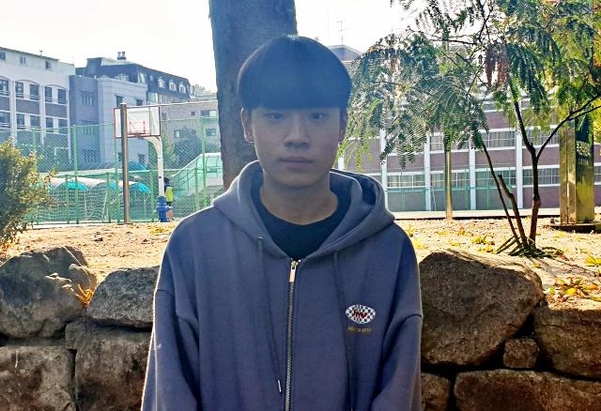 Choi Inho said, “I wanted to help the 1st and the 2nd graders who could not help remaining silent because the teachers evaluated them”.
Choi Inho said, “I wanted to help the 1st and the 2nd graders who could not help remaining silent because the teachers evaluated them”.
Korean high school students showed the first-ever group behavior against “the anti-Japan education” by their school. On 22nd, 150 students at Inheon high school in Seoul submitted the petition that demanded “the inspection of the school” from Seoul Education Bureau. The students said that teachers who had a political thoughts had forced the students to shout “we object to Japanese economy aggression! object!” or “the Liberal Democratic Party of Abe shall perish! perish!” at the time of campus event. The students say “teachers’ acts suppress the sense of values taught at our school and freedom of the conscience and they are the reckless attempt that treads the human rights of the students”. They submit a problem for the student human rights. There are some testimonies such as “The teachers said that all the doubt-related news on Cho Guk, Minister of Justice were fake news”, “When I said ‘I hate President Mun’ in my class, the teacher said ‘I like the President. Are you the extreme right?’” The students said about the reason why third graders play a key role, “We are ashamed, but we were waiting for the finish of mentioning “the record book” that influenced the university entrance exam. Because the teachers make “the record book”, they could give us the disadvantage. So we can protest now, because the teachers finished making “the record book” for the 3rd graders. They said, “guarantee freedom of sense of values and the conscience of the student”. It is the first time in the Korean history that 150 Korean high school students started the group action against the anti-Japan education. They seem to attract attention more from now on. |
My Opinion
|
 the drop curtain of “Boycott Japan” hung in Seoul
On August 2, Japanese Government decided at the Cabinet meeting that it would remove Korea from “white countries” (preferential countries).
the drop curtain of “Boycott Japan” hung in Seoul
On August 2, Japanese Government decided at the Cabinet meeting that it would remove Korea from “white countries” (preferential countries).
While Japan emphasized the side of the trade management saying that it was cancellation of the preferential treatment, and dealt with the problem “in a businesslike manner”, the reaction of the Korean side was obviously “emotional” against the Japanese side. At first, “Democratic Party of Korea”, the Korean ruling party attacked Japanese measure, using the stimulating words, “the economic aggression”. Next the Korea media described Japan as “a bullying and strong country” and Korea as “a bullyed and weak country”. They set fire to the antipathy of the Korean people against Japan. The pro-government citizen group and the anti-Japan left wing citizen group joined it. Then it was “boycott of Japanese products” that the groups chose as means of the counterattacks for Japanese “economic aggression”. At the first stage Toyota, Nissan, Canon, Sony, Panasonic, Mitsubishi, etc. became the target, and they aimed Asahi Beer and Uniqlo as the important targets in them. The both companies continue the steady advance in Korean market. The Asahi Beer was a popular item that had share of 38% in Korean import beer in 2014, and sales of Uniqlo rapidly increased more than 50 times in these ten years, and came to be called “the national brand”. The citizen group performed pouring Asahi Beer to a trash box in anti-Japan demonstration. The student group of universities accused Uniqlo with their placards that wrote anti-Japan slogan in front of the sales floor in spite of the hot weather, and they shouted boycotting of Uniqlo.  cameras of reporters who reported on anti-Japan demonstration
However, ironically, those patriotic actions made people know how the influence of the Japanese products was big.
cameras of reporters who reported on anti-Japan demonstration
However, ironically, those patriotic actions made people know how the influence of the Japanese products was big.
The movies, photos and these scenes that people saw through SNS were too funny. 99% of cameras of reporters who reported on anti-Japan demonstration were made in Japan, and a band that played for the performance of the anti-Japan event sang a song to uplift the national consciousness with Japanese musical instruments such as YAMAHA, KORG and ROLAND. When it was reported that the drop curtain of “Boycott Japan” in Seoul could be made by only the press of Mutoh Industries, I couldn't but burst into laughter. Furthermore, the embroidery of the anti-Japan slogan into a T-shirt was made by the sewing machine of Brother Industries, and the pen with the antique atmosphere on the anti-Japan advertisement was made by Pilot Corporation. It was exposed one after another that the boycott campaign of the Japanese products was in fact supported by “products made in Japan”. |
 Sunlight pours into the Antarctic Ocean (MARCEL MOCHET / AFP)
Sunlight pours into the Antarctic Ocean (MARCEL MOCHET / AFP)
AFP: US files illegal fishing complaint against S.Korea under free trade pactWashington. US authorities for the first time filed a complaint against South Korea under environmental rules of the free trade pact between Seoul and Washington, over illegal fishing, the government announced Thursday, AFP reported. The US Trade Representative's office said it “intends to seek environment consultations" with Seoul under the terms of the US-Korea Free Trade Agreement, the first step in a formal trade complaint. The trade representative's office cited a government report that named South Korea, saying the country failed to stop its vessels from “engaging in fishing activities that violate conservation and management measures." In a periodic report also released Thursday, the US National Marine Fisheries Service said that in late 2017 two South Korean-flagged vessels used long-line gear within 24 hours of the notified closure of a fishery in violation of international rules. Korean authorities ordered the vessels back to port and temporarily suspended their licenses but imposed no fines and did not confiscate their catch, according to the report. Prosecutors declined to bring charges, finding insufficient evidence that the violations were intentional, and under South Korean law, no other remedies existed to prevent the vessels' operators from enjoying the benefits of the alleged illegal fishing. In discussions with US officials, South Korean officials have recognized the need to amend their laws and have said they are in the process of doing so. |
My Opinion
|

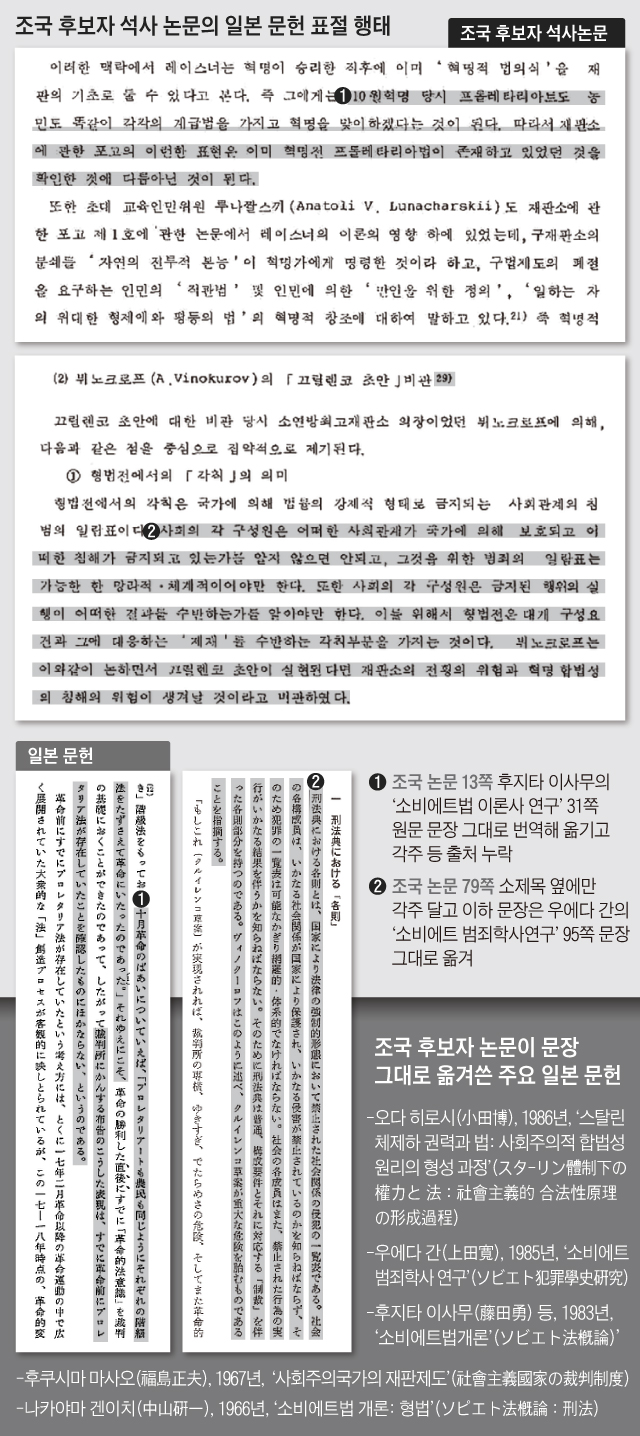 Cho Guk’thesis
Cho Guk’thesis
A suspicion that the thesis for master degree of the Seoul Univ. by Cho Guk, the candidate of Minister of Justice was the plagiarism was submitted. The suspicion is that his thesis gathered together Japanese documents. Cho Guk's thesis played a big role in the appointments of the master officer and the Ulsan instructor. It is the first time to compare his thesis with Japanese documents and to arouse the suspicion. On September 4, the study inspection center, the inspection private sector of the thesis said, “We compared his master's thesis of the Seoul Univ. with Japanese documents and analyzed it. We confirmed there were 33 places that did not have appropriate quotations and just used Japanese documents. We will demand an investigation from study credibility Committee of Seoul University about the Cho's article that gathered together Japanese documents and plagiarized them.” His thesis is “A study about the formation and the development of the theory in the socialism law and the criminal law of the Soviet Union”, 1989. The Japanese documents which his thesis made reference are 15 books including “A study of history of Soviet Union law” by Isamu Fujita. It was confirmed that Cho had analyzed these Japanese documents by Korean language and just used them. He did not attach the footnotes with the sources or he just used Japanese documents without quotations. In this case there was no “the para-phrasing” to change a Japanese sentence into his words. The person concerned of the inspection center said, “There are 33 copies that did not show the sources in his thesis that had 114 pages except the list of references”. The professor at a private university in Seoul said, “This is the vicious plagiarism that exactly did not have quotation marks and used other person's sentences as his”. The inspection center said, “Even 30 years ago, there was nothing such a thesis. Japanese authors can make the copyrights problem.” The person concerned of the court said, “It is a surprise that he depends on Japan in this way though he fans anti-Japan sentiment”.
|
My Opinion
|
 Moon Jae-in, the President of S. Korea
Moon Jae-in, the President of S. Korea
On August 29 Japanese Government excluded Korea from so-called “the white countries” that could take the preferential treatments on the export control. Moon Jae-in, the Korean President said, “Even if Japan apologized once or we agreed something once, you can not end the problem. ” Japanese Government has been saying, “The issue of so-called ‘wartime laborers’ was settled in ‘the Treaty on Basic Relations between Japan and the Republic of Korea' in 1965.” |
My Opinion
|
 U.S. Secretary of State Mike Pompeo (AP)
U.S. Secretary of State Mike Pompeo (AP)
The U. S. Department of State and the Department of Defense announced the opinion “We expressed strong concern and disappointment over Moon administration’s decision to terminate a military intelligence pact with Japan (GSOMIA) on 22nd. It is very exceptional for the United States to use “Moon administration”, not “ROK” (Republic Of Korea) as an official comment. U.S. Defense Department spokesman issued a statement that also expressed “strong concern and disappointment” over the decision reached by South Korean President Moon Jae In’s government. This decision reflects the Moon administration’s serious misunderstanding on a serious challenge against the security we faced in northeast Asia.” The spokesperson of the U. S. Department of Defense also commented, “We expressed the strong concern and the disappointment about ’Moon administration’.” It is very rare to use the expression “Moon administration”, not the Korean government, when the U. S. government expresses a thumbs-down to Korea. Even when the withdrawal of Terminal High Altitude Area Defense missile (THAAD) deployment became the problem in 2017, the U. S. Department of State said, “We want you to hear the Korean government”, but it did not use the expression “Moon administration”. Cheongwadae explained, “the United States showed understanding” about scrapping of GSOMIA, but the official of the Trump administration said to us, “That is a lie. It is not a fact definitely. We protested the Korean embassy to the United States and the Korean Ministry of Foreign Affairs.” It is extremely rare for them to use the expression “a lie”. |
 South Korean protesters react as they hear the news that
South Korean protesters react as they hear the news that
Seoul has scrapped its intelligence-sharing agreement with Tokyo. The signs they are holding called for the deal to be abolished. (Lee Jin-Man/Associated Press) South Korea on Thursday scrapped an agreement to share military intelligence with Japan, significantly escalating the stakes in the U.S. allies’ dispute over trade and historical grievances. The decision was met with disappointment in the United States, which views intelligence sharing between the allies regarding North Korea as critical. “We’re urging each of the two countries to continue to engage,” Secretary of State Mike Pompeo said during a news conference in Ottawa. “There is no doubt that the shared interests of Japan and South Korea are important and they’re important to the United States of America. And we hope each of those two countries can begin to put that relationship back in exactly the right place.” Kim You-geun of the National Security Council in Seoul said Japan’s decision to drop South Korea from a list of trusted trading partners earlier this month, citing security issues, “brought about fundamental changes to the environment for security cooperation between the two countries.” “Under these circumstances, the government of the Republic of Korea decided that maintaining this agreement, which was signed to facilitate the exchange of sensitive military information, does not serve our national interest.” The pact, known as the General Security of Military Information Agreement (GSOMIA), was signed in 2016 in the face of a growing threat from North Korea’s nuclear weapons program. “This will only get worse, and it’s only American leadership that can bring the parties together,” tweeted Harry Kazianis, senior director at the Center for the National Interest in Washington. “I don’t think a lot of western analysts realize that the S Korea left doesn’t share the GSOMIA assumption that Japan is a partner and NK an opponent,” tweeted Robert E. Kelly, a political science professor at Pusan National University. “To the left here, it’s the opposite. The world is now learning just how sharply polarized South Korea is over Japan and North Korea.” “Not renewing GSOMIA is a stunningly stupid decision by South Korea that will hurt itself more than anyone else,” tweeted Mintaro Oba, a speechwriter at West Wing Writers and a former Korea desk officer at the State Department. “Seoul will pay a very grave price for this in Washington. It is not in keeping with a constructive approach to the U.S.-Korea alliance.” “With Pyongyang bolstering its military capability through repeated weapons tests, intelligence sharing is more important than ever to counter nuclear threats from North Korea,” said Lee -Ho-ryung, a researcher at the state-run Korea Institute for Defense Analyses in Seoul. “South Korea’s withdrawal from GSOMIA undermines trilateral security cooperation between the United States and its two most important allies in East Asia at a critical time,” Lee said, adding that it also would send a “wrong signal to North Korea.” The dispute began with consecutive South Korean Supreme Court rulings last year ordering Japanese companies to compensate victims of forced labor during Japan’s occupation of Korea from 1910 to 1945. The judgments infuriated Japan’s government, which gave South Korea an economic aid package as final compensation and settlement of historical grievances when the countries restored diplomatic relations in 1965. Japan’s response was to strike at South Korea’s status as a trusted trading partner, first imposing export controls on three chemicals vital for South Korea’s world-leading semiconductor industry and then removing the country from a “white list” of 27 nations that are trusted to import goods that may have -military uses without jumping through bureaucratic hurdles. Tokyo says it took the trade measures on national security grounds because of lax South Korean export controls, but the moves were widely viewed as retaliation. Nationalist outrage has been fierce in South Korea, where bitterness about the country’s treatment during the Japanese occupation remains very much alive. There have been widespread boycotts of Japanese goods, including beer, cigarettes and clothes, and fewer South Korean tourists are visiting Japan. |
 Logo of “NO Japan” and the fake photo of “Korean war time laborers”
Logo of “NO Japan” and the fake photo of “Korean war time laborers”
On August 14th, a meeting to protest Japan about comfort women problem was held in front of Japanese Embassy in Seoul, Korea. Then handbills that had the photo of the Korean war time laborers were distributed, but the photo was wrong. The handbill has the Hangul Alphabets that says “admit, apologize and make reparation for so-called the Korean war time laborers!” and a photo of the miner, with a logo of “NO” that calls for boycotting Japanese products. In fact, the man on this photo is a Japanese who worked in Chikuho coalfield (Fukuoka). It is the photo of the man in the coal mine shaft. Koichi Saito, the Japanese photographer took that in Fukuoka in 1961. When the advocacy ad “Gunkan island was hell island” was projected on an electric signboard in Times Square in New York in 2017, the photo was misused. and the Korean university professor concerned with the ad admitted the mistake. Such a misuse for criticism of Japan has no limit in Korea. |
My Opinion
|
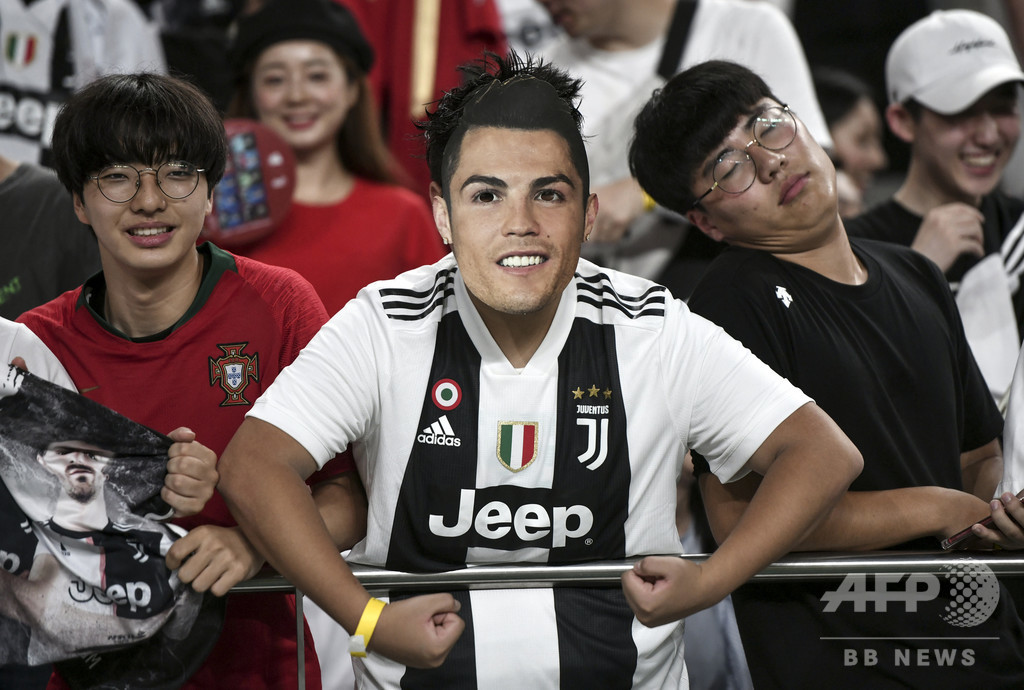 Korean fan puts on a mask of Cristiano Ronaldo of Juventus
in soccer friendly game, K league all-stars vs. Juventus.
Korean fan puts on a mask of Cristiano Ronaldo of Juventus
in soccer friendly game, K league all-stars vs. Juventus.
An angry South Korean fan flew to Sweden to confront Juventus superstar Cristiano Ronaldo for sitting out a friendly in Seoul, the latest in a bizarre row that has prompted a police investigation. In an 11-minute clip posted on his Youtube channel, which has racked up nearly 3,000,000 views, Kwak Ji-hyuk approaches the Portuguese striker at a hotel in Stockholm. As Ronaldo appears in the lobby of the hotel, where Juventus were staying for last week’s International Champions Cup final, Kwak shouts in English, “Why didn’t you play in Korea?” only to be ignored. Ronaldo remained on the bench throughout last month’s exhibition game in the Korean capital, enraging fans who threatened a class action lawsuit and prompting a police probe into alleged fraud. Kwak - who describes himself as a former die-hard fan of Ronaldo - films himself making several more attempts to grab the star’s attention, including waving a sign written in Portuguese. “Even when I put the sign right in front of his eyes, I was utterly ignored,” Kwak says in the video. “You are so nice to your fans here but why did you do that to us?” he adds bitterly. |
My Opinion
|
 The drop flags appeal for “boycott Japan”
The drop flags appeal for “boycott Japan”
Seoul Shizhong District installed flags of “No Japan” in Myondong, but collected them immediately. It took civic repulsion. The opinions overflowed. “Why does the government intervene the pure citizens' movement?”; “It's people who do the dogs' quarrel”. “The government and the local government should keep calmness”. The merchants protested and said, “If Japanese tourists do not come, it is us who receive a blow. Don't score an owngoal.” It is an irony. The Japanese press machine printed a flag of “No Japan” that Shizhong District ordered. It is the machine called “Value jet” of Mutoh Industries, Japan. The anchorman of KBS said “This ball-point pen is a domestic product”, but the camera that took the scene would be made-in-Japan. When Seodaemun District buried stationery and office supplies made in Japan, did the district leave the made-in-Japan copier? There is no self‐sufficient country that can make every products and all parts and the materials in the world. The two countries, Korea and Japan are closer, even if so. They are closer geographically and there are many technology exchanges. |
 Anchorman says, “This ball-point pen is made-in Korea”. (left)
The curtain writes, “2020 Tokyo Olympics boycotts” (right)
Anchorman says, “This ball-point pen is made-in Korea”. (left)
The curtain writes, “2020 Tokyo Olympics boycotts” (right)
“During broadcasting, we had a telephone of the protest from the audience who wondered if this ball-point pen I had was made in Japan. I can understand how big the anger of the Korean people against Japan is. This ball-point pen is domestic product. That is all for the news of 9:00. Thank you.” These are the words that the caster of the main news, “KBS’ news 9” said after he finished reading news on the night on 4th August. On the next morning KBS published an Internet article that introduced this affirmatively with the title “this ball-point pen is a domestic product. - Why did these words come up as the closing words of the KBS news?” Then the comments more than 1,000 were sent in portal site “Naver”. “Do all the people who married a Japanese have to divorce or expel them from our country?” “90% of expensive medical equipments are made in Japan. You must not have surgery”. Most comments were the banters. There was a comment, “Where is the camera that shoot the news made?”. It is said that the cameras used in the KBS main news are made in Japanese Sony. As the discord between Korea and Japan deepens, big or small “anti-Japan disturbances” occur successively in many places in Korea. If you have a Japanese product, or you have an ancestor who was a lower grade public employee in the period of Japan’s rule, you will become a target of protest and the criticism regardless of the progressives or the conservatives. Suweon city in Gyeonggi-do declared “New products encouragement campaign”. That means to refuse using Japanese products and taking a journey to Japan. Anyang city, Gunpo city, Siheung city and Yangju city decided to cancel the purchase of the Japan products. For Japanese cars, some car maintenance suppliers refuse repair and even attack them. The owners of the cars take the self defense. The other day, Chon (30) who has Nissan put a sticker on his car. It says, “I will scrap my Japanese car”. Because whenever he meets a person, he is asked “Are you OK, though you ride on a Japanese car now?” The sticker “I’m sorry to ride on a Japanese car” is also sold in the town. |
My Opinion
|
|
As soon as supermarket manager Cho Min-hyuk got to work the day after Tokyo imposed curbs on exports to South Korea, he pulled all Japanese products off the shelves. It was Cho’s way of taking a stand against Japan in a quickly worsening political and economic dispute between the two east Asian neighbors. Such anger has prompted a widespread boycott of Japanese products and services, from beer to clothes and travel, disrupting businesses in what was already the worst economic climate for South Korea in a decade. Cho, who manages a 1,500 square meter Purunemart supermarket in Seoul, is taking the hit voluntarily. Over 200 other supermarkets and grocery stores are doing the same, according to Korea Mart Association, a trade group representing them. “Japan putting pressure on South Korea through export curbs, showing no regret over its past wrongdoings, is completely unacceptable,” said Cho, adding the 10-15% drop in sales he is already facing won’t change his mind. Diplomatic tensions intensified since a South Korean court last year ordered Japanese companies to compensate Koreans who were forced to work for Japanese occupiers during World War Two. On July 4, in apparent retaliation, Japan restricted exports of high-tech materials to South Korea, but denied the move was related to the compensation issue. Tokyo cited “inadequate management” of sensitive exports, with Japanese media reporting some items ended up in North Korea. Seoul has refuted t BEER, CLOTHES, HOLIDAYS Seoul has resisted taking any countermeasures, saying it would raise the dispute with the World Trade Organization. But Koreans are taking matters into their own hands, with beer apparently an easy target. The country’s top two convenience stores CU and GS25, run by BGF Retail (282330.KS) and GS Retail (007070.KS), told Reuters sales of Japanese beer plunged 21.5% and 24.2%, respectively, in the first two weeks of July from the previous two-week period. E-Mart (139480.KS) reported a 24.6% fall. Hongcheon Culture Foundation, a beer festival organizer, told Reuters it canceled an order of 1.2 tonnes of Kirin beer even as at last year’s edition the Japanese brand accounted for a tenth of revenues. South Korea buys 61% of Japan’s beer exports, spending 7.9 billion yen ($73.13 million) in 2018. Asahi Super Dry is the most popular imported brand, with sales tripling in the past five years, according to Euromonitor. An Asahi spokesman said the company was monitoring developments but declined to comment on the impact. Screenshots of Japan trip cancellations are trending on social media. Hanatour (039130.KS) said it now receives 500 tour reservations for Japan a day, from an average 1,100. Very Good Tour (094850.KQ) said new bookings fell 10% while cancellations rose 10% week-on-week. “If someone did something wrong, they shouldn’t be proud of themselves,” said Lee Sang-won, a 29-year-old designer, who canceled his Japan trip for a 130,000 won ($110.15) fee. Lotte Home Shopping said it stopped airing TV ads for Japanese tour packages as they expect poor results. JejuAir (089590.KS) and Korean Air (003490.KS) reported a “slight drop” in bookings for Japan, with the latter blaming the pulling of the TV ads. |
My Opinion
|
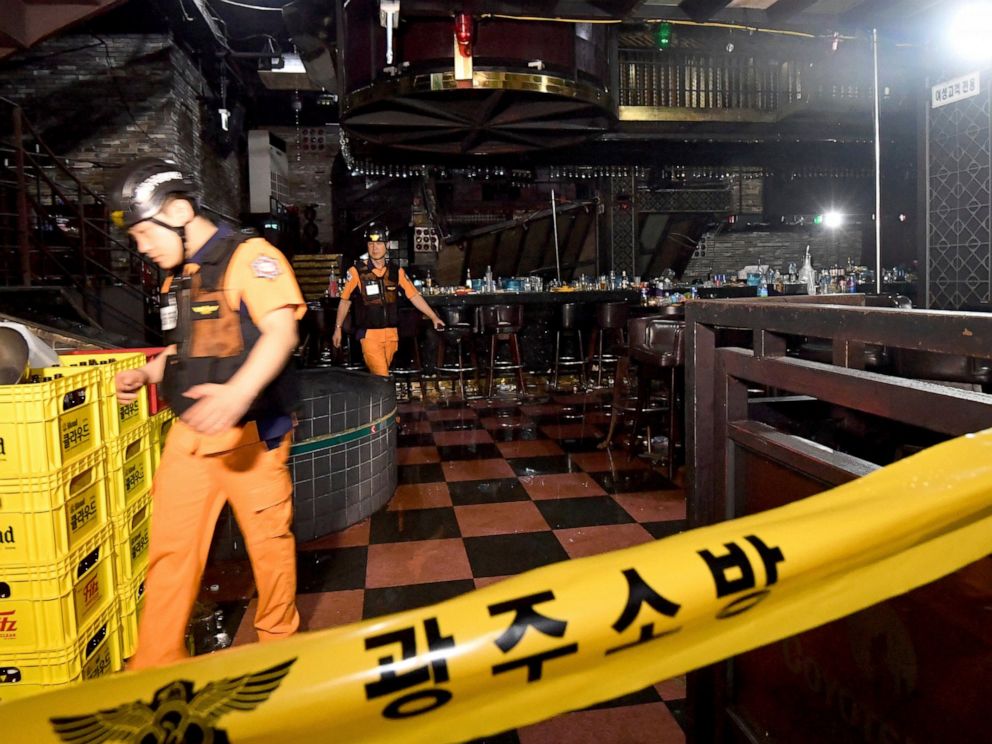 Rescue workers walk to inspect a collapsed internal balcony at a nightclub in Gwangju, South Korea, Saturday,
July 27, 2019.
Rescue workers walk to inspect a collapsed internal balcony at a nightclub in Gwangju, South Korea, Saturday,
July 27, 2019.
At least two people are dead, and several others injured, including members of USA Water Polo, after a balcony collapsed at a nightclub hosting U.S. athletes in Gwangju, South Korea, which is currently hosting the 2019 World Aquatics Championships, according to several reports. USA Water Polo announced on its Twitter feed that several senior team players were at the club when the collapse took place. |
My Opinion
|
 Nikon and Yakult, the advertisements at the 2019 FINA World Championships
Nikon and Yakult, the advertisements at the 2019 FINA World Championships
The 18th FINA World Championships is being carried out in Kwangju with a one million population, southwest of South Korea. The big advertisements of the official sponsors, “Nikon” and “Yakult” appear at the best position around the pool and you can see them whether willing or not. Though it is the world championship, the Korean media do not report it very much, because there are little Korean swimmers. The Japanese people living in South Korea say, “because of those advertisements?”. The boycott campaign of Japanese products became lively in a net at first and TV stations started the agitation afterwards. TV shows find out various “patriotism and boycotting performances” and introduce them exaggeratedly, but most of the TV cameras that broadcast the anti-Japan scenery are “Sony”. It is really sad. In the first place this boycott of Japanese products began, because Japan regulated semiconductor material exports. Koreans shout “Sell Japanese products” and on the other hands they shout “Don't sell and use Japanese products”. When they are excited, they can't notice the contradiction. |
My Opinion
|
 Japanese Engineer, YUICHI HATAMURA, Busted at Golden Sorya Mall, Phnom Penh
Japanese Engineer, YUICHI HATAMURA, Busted at Golden Sorya Mall, Phnom Penh
Phnom Penh: A man was arrested for possession of a stimulant on July 24 in Phnom Penh, the capital of Cambodia. The Cambodian media said on the 25th, “Two small sachets of stimulant were found in the possessions, detaining Japanese design engineer Hatamura Yuichi, who had been making suspicious movements, in a downtown area in central Phnom Penh.” I reported it all at once. However, when FNN confirmed with the Japanese embassy, ??it got an unexpected response. The man was not Japanese After receiving a report on the Japanese arrest, a Japanese embassy representative immediately met with the person. As a result, it was found that the man was not Japanese. However, Cambodian media also believes the Cambodian police saying “Japanese arrested.” Why is this happening? FNN also contacted police and confirmed the authenticity of the information and found that the man was lying at the time of his arrest.The arrested man was Korean nationality When FNN interviewed a local Cambodian police, it became clear that the man was arrested making suspicious movements in downtown Phnom Penh on the night of the 24th, he was detained by a local police officer and taken to the police station. Two packets of stimulant (meth) were found. After that, the man told the police officer that “I am Japanese. The name is Hatamura Yuichi. I am 38 years old.” Based on the information, it was reported “Japanese arrest” at the same time. However, when a person in charge at the Japanese embassy interviewed the person directly, it turned out that he could not understand Japanese at all. Even though he said that he was “Japanese,” he later found out that the man was not Japanese, but Korean. To confirm the authenticity, FNN confirmed the suspect’s passport. On the cover of the man’s passport, the letters “Republic of Korea”. The man had entered Cambodia with a Korean passport. “KANG JU SUNG” and the photograph of the face was clearly the same person as the man who was arrested. |
My Opinion
|
 Italy's Simone Sabbioni starts to race alone in
his men's 100-meter backstroke heat following equipment
issues at the World Swimming Championships in Gwangju,
South Korea on July 22. (AP Photo)
Italy's Simone Sabbioni starts to race alone in
his men's 100-meter backstroke heat following equipment
issues at the World Swimming Championships in Gwangju,
South Korea on July 22. (AP Photo)
GWANGJU, South Korea--Equipment malfunctions plagued the preliminary heats of the men's 100-meter backstroke at the world swimming championships on Monday. Simone Sabbioni of Italy and Dylan Carter of Trinidad and Tobago both experienced problems with the wedge, a device used to gain leverage off the wall during a backstroke start. “This should not be happening at any meet, far less the world championships,” Carter said. The backstroke wedge allows a swimmer to put their weight onto an angled piece of material to push off, rather than trying to grip their feet onto a flat wall at the end of the pool. Carter was allowed to swim a second time, doing so alone. His time of 54.03 seconds was good enough to advance to the semifinals. “When I found out I was getting another chance I had my suit off so I had to put on another suit and get ready,” he said. “It's unfortunate and it's not fair to me that I have to swim twice to make the semifinal.” Compared with Sabbioni, however, Carter seemingly got off easy. Sabbioni, speaking in Italian, said he informed officials something felt wrong with the wedge before his heat, but they checked it and assured him it was fine. After his bungled start it was obvious the straps had given out and caused him to fall backward into the water. He was then allowed a second attempt alone in the pool, but the equipment failed again. On his third try, he finished in 53.85 and advanced to the semifinals. |
 Dylan Carter took down his own national record in a solo
100 back re-swim Monday morning at the 2019 FINA
World Championships.
Dylan Carter took down his own national record in a solo
100 back re-swim Monday morning at the 2019 FINA
World Championships.
GWANGJU, South Korea--On the heels of Italian Simone Sabbioni’s 100 back time trial for a 13th-place semifinal berth after two blatant backstroke wedge malfunctions, Trinidad and Tobago’s Dylan Carter was granted the same opportunity, squeaking into semis at 16th place by .01 seconds. With his 54.03 re-swim, Carter bumped Italian Thomas Ceccon ? who had been 54.04 ? out of getting another swim. Carter’s second swim came after official results were posted, and took place between the men’s 200 free and women’s 1500 heats. Carter bested his former 54.09 Trinidad and Tobago record from Canadian World Trial in April, as well. Just from rewatching his original race video, it’s not totally clear that Carter suffered a major issue with the wedge, but it appears it possibly gave out, or he slipped. A handful of swimmers struggled with the wedge throughout both the men’s and women’s 100 back heats, and Sabbioni’s clearly gave out. The USC alum Carter was 55.35, tied for 30th overall, after the first swim. |
My Opinion
|
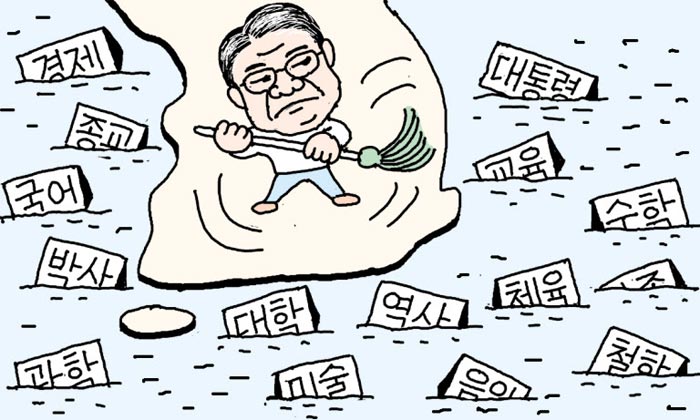 (illustlation:ChosunIlbo)
(illustlation:ChosunIlbo)
“Dictionary of Korean words derived from Japanese” has 3,634 Japanese words that have become Korean words since the 1880s. Approximately 90% of them are pronounced in Korean style. They are “교육 (education)”, “가족 (family)”, “국민 (nation)”, etc.. The remainder is pronounced in Japanese style. They are “모나카 (Bean-jam-filled wafers)” “만땅 (filled up)”, “무데뽀 (recklessness)”, etc.. The Gyeonggi-do Government Board of Education sent a document to the elementary schools, the junior high schools and the high schools in the area. And it pointed out that “단어 (the words) such as 수학여행 (school excursion), 파이팅 (fighting) and 훈화 (moral discourse) are the dregs of the Japanese imperialism, because they came from Japan”. The Board of Education asked children and students. “What do you (본인) think is the concept (개념) of the dregs of the Japanese imperialism? And how should you liquidate (청산) the problem?” However, “본인” “개념” “청산” in these sentences are the words that came from Japan. “단어” (word) is so too. Ee Jae-jeong, the chairman of the Board of Education majored in German and German literature at a university and acquired a doctor degree in religion and theology in the graduate school. However, in fact, it is Japanese who translated “Deutschland” as “독일 (Dogil)”, and the words such as “대학 (university)”, “대학원 (graduate school)”, “신학 (theology)”, “종교 (religion)” and “박사 (doctor)” all came from Japan. “과학 (Science)”, “철학 (philosophy)”, “물리 (physics)”, “역사 (history)”, “미술 (art)”, “음악 (music)” and “체육 (physical education)” are all Japanese words, not to mention “국어 (national language), 영어 (English) and 수학 (mathematics)”. Besides, a Japanese translated “president” as “대통령”. In the days of the Meiji Restoration, Japanese made an English-Japanese dictionary. Then they translated “liberty” as “자유”, and “economy” as “경제”. These words began to be conveyed to Korea later and large quantities flowed in forcibly in the era of Japanese imperialism. The words that Japanese translated entered Korea continuously after liberation too. Now is the time people in the world have relationship with each other and exchange something through the Internet in real time. It is too natural that the words of various countries mix. They have completely become Korean and are used naturally without a feeling of incongruity or refusal. On earth what should we do, if we are ordered not to use Japanese words that are the dregs of Japanese imperialism.? |
My Opinion
|
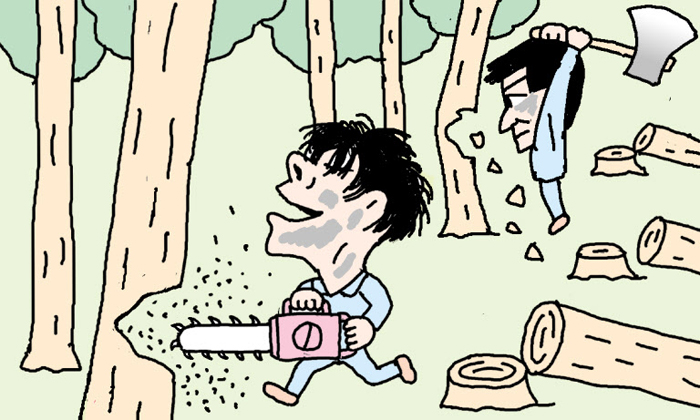 (illustlation:ChosunIlbo)
(illustlation:ChosunIlbo)
A tree of Juniperus chinensis was embroiled in controversy this time. On June 3, Jeju-do assembly announced “Clearing-up plan of the dregs of Japanese imperialism”. The Board of Education in Jeju says “If the regulations plan passes, we will cut down the Juniperus chinensis planted on the campus, dregs of Japanese imperialism". 21 schools in total in Jeju Island appoint this tree as school tree. 2,157 Juniperus chinensis of school grounds are going to be cut down mercilessly. The road names and the school songs were changed and this time a plant is attacked, because the President demands clearing-up of pro-Japanese. It is 1928 that the tree name called Kaizukaibuki (Juniperus chinensis) comes up for the first time in Japan, and it is said, “there was not such tree as of 1909”. Japanese book published in 1930 records that the Juniperus chinensis that Hirobumi Ito had planted disappeared completely. The origin of the Juniperus chinensis is in Korea, Japan and China. They are multiple places. The Juniperus chinensis more than 500 years years old grow in Changdeokgung and Seonnongdan in Seoul. On the contrary, the tree of cedar is a Japanese endemic species and Japan is the places of origin. It was brought into Korea in the colony times and was planted as windbreak forests in the fields, the orchard and around the village in Jeju Island. And it became the representative tree of Jeju. If cutting down of Juniperus chinensis is right, you must cut down a cedar first. Jeju will go to ruin. Till when must we watch such a wintry comedy? |
My Opinion
|
 South Korea beat China 3-0 to win the 2019 Panda Cup but were later stripped of the trophy
South Korea beat China 3-0 to win the 2019 Panda Cup but were later stripped of the trophy
At the celebrations that came after South Korea’s 3-0 victory over China to win the Panda Cup, a South Korean player had his picture taken while putting his foot on the trophy. One journalist saw the victorious players pretending to urinate into the cup. They are exposed to great bashing from Korea too not to mention China. The Japanese young team that participated in the panda cup in 2015 four years ago showed splendid behavior. They overwhelmed a Chinese team in 5-1. They shook hands with Chinese players without being arrogant and getting excited after the game, and they went to the Chinese supporters who made atmosphere and lowered their heads, and finally they went to their supporters to say “thank you”. Japan is the last champion of the panda cup. “The insanity” of Korea is caused by the regional and complicated geopolitical environment. As a peninsula nation, they were going to remove other influences. The victory of sports may let them forget this kind of circumstances temporarily.  Japan beat China 5-1 to win the 2015 Panda Cup, Japanese players thank to the Audience
Japan beat China 5-1 to win the 2015 Panda Cup, Japanese players thank to the Audience
|
 South Korea beat China 3-0 to win the 2019 Panda Cup but were later stripped of the trophy
South Korea beat China 3-0 to win the 2019 Panda Cup but were later stripped of the trophy
Korea Republic U-18s have emerged as the winners of the Panda Cup 2019 after finishing above Thailand U-18s in the tournament held in Chengdu, China PR from May 25 to 29. However, Korea Republic youngsters’ triumph, which was confirmed with a 3-0 win over China on the final matchday, is in the news for all the wrong reasons after they were accused of disrespect by the Chinese media and social media alike. A picture of their title celebration in which one player was seen with his foot on the Panda Cup was what caused the uproar with Chengdu Football Association demanding an apology from the Korea Football Association (KFA) and warning them that they will not be invited again for the annual tournament. The South Korean players and coaches were forced to make a public apology at their team hotel later in the day. “First of all, we apologise for the situation, one of our players made a huge mistake,” the AFP quoted a Korea Republic team official. |
My Opinion
|
 Kang Hyo-sang, a member of Korean Congress
Kang Hyo-sang, a member of Korean Congress
Over a member of the opposition party who disclosed the contents of telephone conference of President Moon Jane and Donald Trump, U. S. President, a debate arises. Kang Hyo-sang, a member of Congress said, “When President Moon teleconferenced with President Trump on May 9, he asked for a visit to Korea (before his visit to Japan in the end of May) and said ‘I’d like you to visit Korea even just a little’. President Trump answered, ‘It would be enough to drop in a little on the way to the United States after a visit to Japan’.” Ko Min-jeong, the spokesperson of Executive Office of the President objected his argument immediately, “It is not a fact at all”. However, the Executive Office of the President tries to take the disciplinary measure for the diplomat K who was named as a person of information leakage and accuse him for the diplomatic secret leak charge. However, the Executive Office still says, “It is not a fact” about what Kang Hyo-sang said. |
My Opinion
|
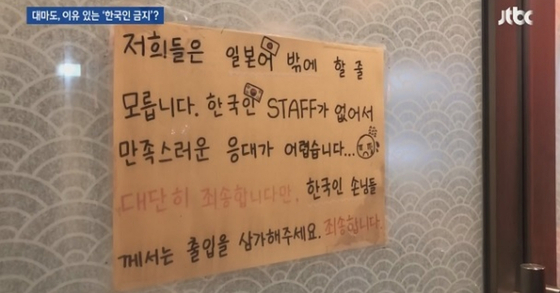
At the Izuhara mall of the downtown in Tsushima, Nagasaki, you can see some posters, that write “We can speak only Japanese. Our shop refrains from welcoming Korean visitors.” “Please accompany the person who can speak Japanese”. Japanese storekeepers refuse the Korean visitors because of the problems of their complaints to the menu and the price. A woman storekeeper said, “The Koreans wait still and don’t get out, though I say that our shop has neither the ramen nor the udon”. Another eating and drinking storekeeper insisted, “Ten Koreans came and after they drank one bottle of rice wine and ate some nibbles, empty cans of the beer and the foods they brought in were scattered.” A taxi driver criticized them, “The Korean does not agree, if we don’t reduce the fee even a little”. At many places in the Ozakiyama nature park, the tourist attraction of Tsushima, there are graffiti written in the Hangul Alphabet. And the Korean tourists are smoking at the public places and the neighboring rivers are full with the littered cigarette butts. The local inhabitants revealed the dissatisfaction with some Korean tourists who ignored the basic manner. “Even if we put the poster ‘Do not throw away’, they throw away the refuse of cans of the juice and the lunch near the trash box or between the stone wall”. |
My Opinion
|
When I was walking along Seoul’s greatest downtown, Myondong, a familiar colorful signboard got into my eyes. “I see. Don Quixote has opened in Korea too”. ………No, No, it was different when I looked near. The store’s name was “Pierrot Shopping”. But every point looks just like “Don・Quixote”. The signboard with the yellow letters, the appearance based on red, the exhibition method of the products such as the maze and the rich assortment of goods that treats household goods, electrical home appliances and also foods are business form of Don Quixote. It was December, 2018 that the store in Myondong opened, and it is always full of local youths. “Shinsegae Group” runs “Pierrot Shopping”. It is a financial combine and runs the department store that is popular among Japanese tourists. When “Pierrot Shopping” opened, the vice-chairperson of the group threw his chest out and answered the Korean media, “I poured all for one year, and got ready to open”. When a journalist asked him “Isn't it a plagiarism of Don・Quixote?”, he insisted “We learned from the success examples of other companies, so this is a benchmarking ”. “Benchmarking” is a convenient word. However, on the T-shirt which staff of the shop wore as a uniform, such words were printed. “(일본에 가는) 비행기값 아까워서 ㄷㅋㅎㅌ(돈키호테) 직접 만듬” (“Because it is a waste of an air fare (to go to Japan), we made Don・Quixote directly.”) |
My Opinion
|
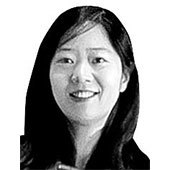 An Hyeri, editorial writer
An Hyeri, editorial writer
“Fighting architect Tadao Ando” has been presented calmly in Korea in 2016. It is a documentary of Tadao Ando (77) who won the Pritzker Architecture Prize in 1995. The prize is often referred to as the Nobel Prize of architecture. This is because Tadao Ando is a very prominent person, but the European deep reverence for Japan drifts to the root here. German writer Hermann Hesse (1877-1962) made “a short stylish person, a Japanese” appear to “Demi Ann” (1919) as a companion of Demi Ann and showed off love for Japan. There are many modern European intellectual and artists like Hesse, who were fascinated by Japan. It is widely known that European painters in the 19th century including Van Gogh were greatly inspired by the ukiyoe print which was a Japanese traditional woodcut. And such a Western love to Japan is present continuous, not a past form. Both founders of Apple Inc. and BLUE BOTTLE COFFEE Inc. that is said “Apple of the coffee industry” were attracted by Japan and put a Japanese soul in their products. Korean often says Japan uses money in order to win the world persons’ favour. However, Japan actually attracted the world persons for its cultural depth and wonderful spirit of crafts. However, when you see Japan through a prism called Korea, Japan becomes the totally different country . It makes Japan a country of the savageness and a country far behind Korea that has high cultural standard. We do not hesitate about the distortion in order to disparage Japan either. Minseok Seol who was a famous Korean history lecturer appeared in the TV variety show and criticized Japan that had destroyed the stone cavern hermitage (Seokguram) . He said, “Seokguram was a perfect crystal of mathematics, geometry and the science. It had lasted more than 1,000 years and had been completely saved, but Japan envied it and injured it with concrete and cement”. However the records are totally different. In 1912 when Japan began large-scale repair construction, the ceilings of Seokguram collapsed and were buried among soil. Japan did its best with the cement that was the latest technique for those days, to revive the cultural heritage. After the broadcast, Japan was surrounded and mauled by the Korea public. Korean people said Japan was the barbarian nation that had envied Seokguram and hurt it. It was a clear history distortion. If you read the document once, it will be found out. But I have never heard that Seol or the broadcasting station corrected that or apologized for that. In fact, it is not what you are surprised at in particular. In Korea, “Anti-Japan for anything Japanese” has always received indulgence in this way. “Anti-Japan for anything Japanese” policy may be easy for our domestic politics, but it makes the nation a fool and brings the nation to a crisis. We had the bitter experiences at the time of Imjin Waeran in 1562 and foreign exchange crisis in 1997, but we cannot learn the simple common sense “You must take things as they are”. |
 Chunchon literature park
Chunchon literature park
On May 1, Chunchon City announced that it would remove the monument inscribed with a poem that praises Seo Jeong-ju, Choe Nam-seon and Cho Yeon-hyeon. The monument is installed in the literature park. It’s because three men are listed in the pro-Japanese biographical dictionary. The pro-Japanese biographical dictionary is edited by “the racial problem research institute” that is known as a left-winger citizen’s group. |
My Opinion
|
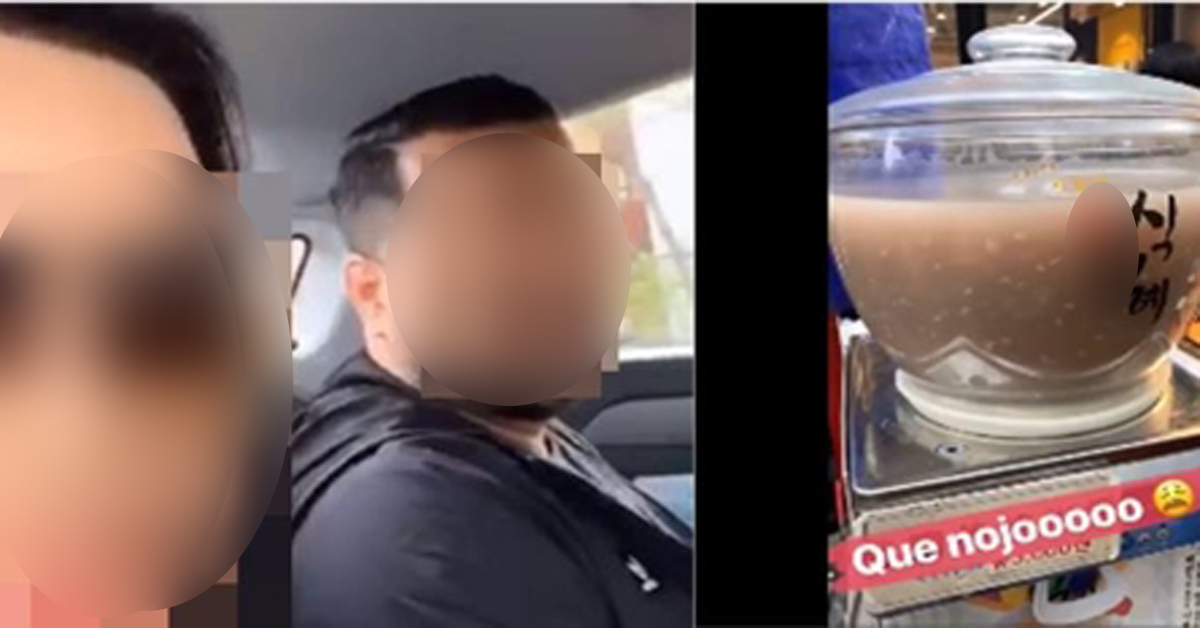 A Brazilian couple staying in Korea contributed a movie that slandered Korea to SNS.
A Brazilian couple staying in Korea contributed a movie that slandered Korea to SNS.
A Brazilian couple staying in Korea contributed a movie that slandered Korea to SNS. Korean dining rooms provide Korean fermented drink “sig-hye”. This couple compared a piece of rice in it with a maggot, and insisted on a falsehood fact “they sell the meat of the dog according to a part”. Korean people in Brazil are concerned that this may injure the Korean image, because the couple has a considerable number of SNS followers. The Korean people in Brazil insist they should tell such a fact to the Brazil Sao Paulo consulate general and the Korean society and examine the legal measure. The consulate general said that he would convey the will of the strong protest to the Brazilian police and its politics. |
My Opinion
|
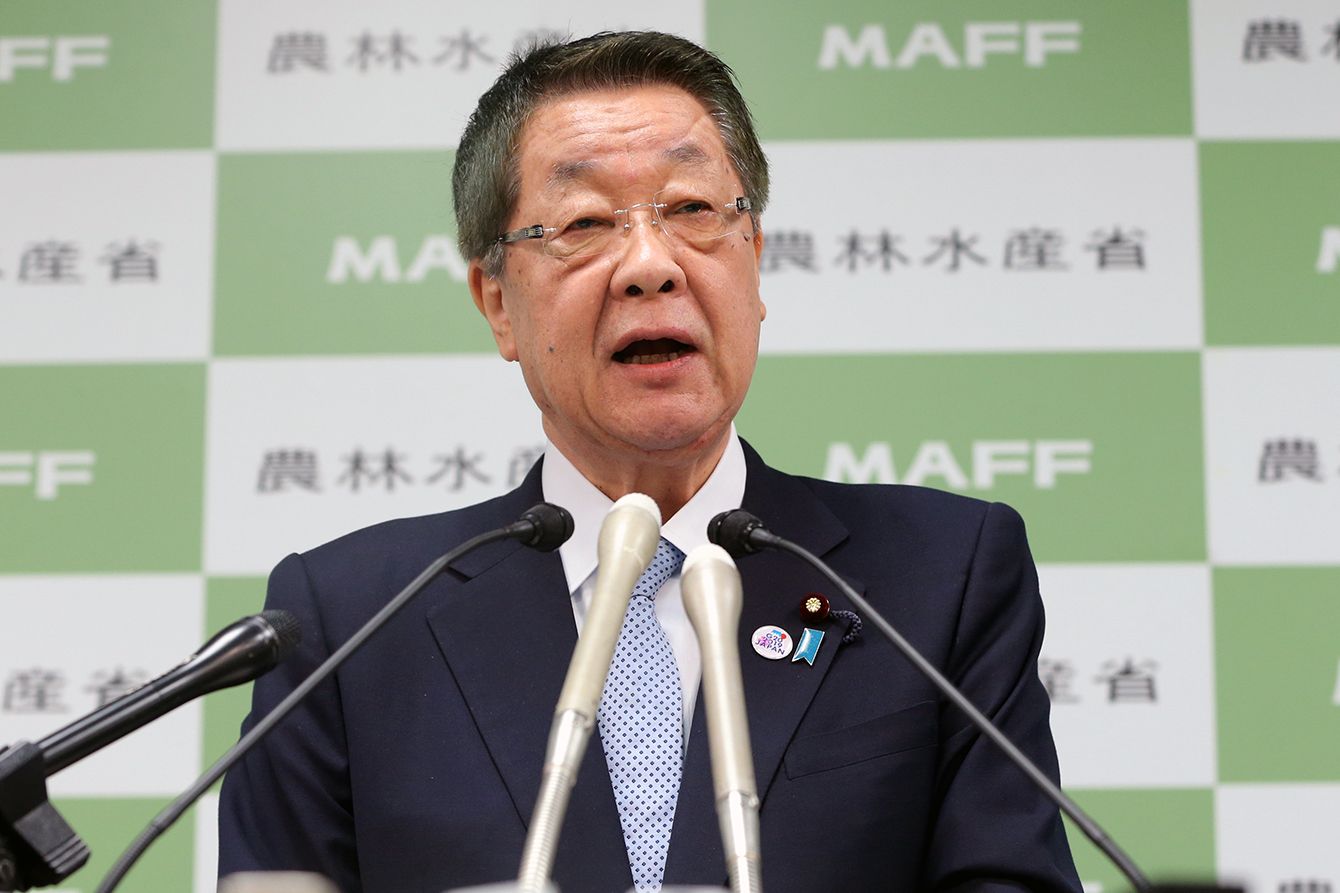 Takamori Yoshikawa, Minister of Agriculture, Forestry and
Fisheries has a press interview after World Trade Organization
(WTO) reversed certain findings made by the Panel.
Takamori Yoshikawa, Minister of Agriculture, Forestry and
Fisheries has a press interview after World Trade Organization
(WTO) reversed certain findings made by the Panel.
|
My Opinion
|
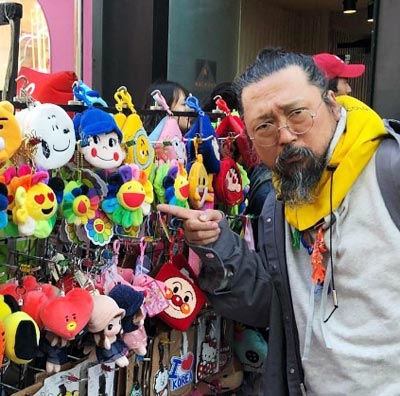 The photograph he photographed in Myondong
The photograph he photographed in Myondong
Japanese famous pop artist, Takashi Murakami accused “fakes" sold in Korea in his own Social Networking Service (SNS) on April 7th. He showed a photograph and a movie which photographed a stall in Myondong, Seoul. Coin purses, cushions and the handbags his representative characters were drawn formed a line on the store of the stall. A character type broach of the genuine product costs approximately 70,000 - 80,000 won (approximately 7,000-8,000 yen). The movie shows that the coin purse was sold for 7,000 won (approximately 700 yen) . Takashi Murakami is a famous artist who is said to be Japanese Andy Warhol. |
| My Opinion |
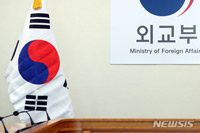 The Korean national flag full of wrinkles
The Korean national flag full of wrinkles
The Korean national flag was raised being full of wrinkles, when the talks of Korea and a Vice-Minister Spanish foreign affairs were held in the Ministry of Foreign Affairs in Seoul. The experts who know a lot about diplomacy say about this, “The Korean government repeated the rude acts to the other countries, but was bitterly humiliated this time”. When President Moon visited Czech last year, Korean Ministry of Foreign Affairs wrote “Czechoslovakia” in Twitter which was the name of the country 26 years ago. The news document of last month transcribed “Barthes” into“Balkan”. When the President Moon visited Cambodia in last month, the Korean Executive Office of the President placed a Taiwanese building in its official Facebook, and the President Moon committed a blunder saying hello by Indonesian in Malaysia. |
My Opinion
|

Many coastal communities in Sierra Leone depend on fishing for food and their livelihood Sierra Leone has banned industrial fishing in its territorial waters for a month from Monday in a move to try to shore up stocks that was applauded by environmental activists. The government also decreed an April 1-30 halt to exports by major fishing companies “to protect our fish stock from depletion”, said a statement from the fisheries ministry. The West African states of Mauritania, Senega, Gambia, Guinea-Bissau, Guinea and Sierra Leone lost about $2.3 billion (more than 2.1 billion euros) a year from 2010 to 2016 due to illegal and undeclared fishing, according to the Greenpeace environmental group. Sierra Leone National Fishermen Consortium chairman Alpha Sheku Kamara accused China and Korea of destroying stocks. “Industrial fishing boats from China and Korea are destroying our nets and also depleting the fish stock,” he said. “We are calling on the government to effectively enforce the ban with surveillance.” “Illegal fishing accounts for about 30 percent of catches by industrial foreign fleets in Sierra Leone, according to the 2017 Sea Around Us project at the University of British Columbia, the University of California at Berkeley and five other organisations. It found that in the past decade industrial foreign vessels have increased illegal activities off Sierra Leone either on their own or by enticing small-scale fishers into illicit partnerships. A representative of a large Chinese fishing company in Sierra Leone declined to comment to AFP. |
My Opinion
|

A proposal has been submitted to a South Korean provincial assembly to require the use of stickers on school products that were made by certain Japanese companies that used South Korean laborers during World War II, it was learned Wednesday. The proposed stickers are said to include the text “war crime company.” The proposal is expected to be submitted to a plenary session of the assembly of Gyeonggi-do, near Seoul, in early April, according to the Chosun Ilbo, a major South Korean daily. According to the assembly’s website, the proposal was sponsored by 27 assembly members, including representatives from the ruling Democratic Party of Korea. The proposal says it is intended to recognize the attitudes of Japanese companies that have not made an official apology or paid compensation over their use of wartime forced laborers although they inflicted damage on South Korean nationals, and to establish a correct recognition of history among students. It targets companies from a list of firms announced by a committee of the South Korean prime minister’s office that are said to have caused damage to the lives and properties of South Korean people, mainly through wartime labor, naming 284 companies. Also targeted are companies that were established after the end of the war with funds from such firms, as well as shareholders in such firms.
|
My Opinion
|
|
An association of foreign news media reporters based in Seoul expressed “grave concern” after the ruling Democratic Party (DP) criticized a Bloomberg News reporter over a story that portrayed President Moon Jae-in as “top spokesman” of North Korean leader Kim Jong-un. The article, published in September last year, drew fresh attention last week after Rep. Na Kyung-won, floor leader of the main opposition Liberty Korea Party, cited it in her National Assembly speech blasting Moon’s policy on Pyongyang. The Seoul Foreign Correspondents’ Club issued a statement expressing “grave concern over the ruling DP’s statement singling out a Bloomberg reporter,” saying it “resulted in serious threats to her personal safety.” “It is disturbing for any politician to accuse any journalist of treason - a criminal offence - for reporting on matters of public interest or voicing an opinion. This is a form of censorship and journalistically chilling,” the statement said. “Questions or complaints regarding an article should be raised with the publication in question rather than personally and publicly targeting a reporter.” Founded in 1956, the club has about 500 journalists from 100 news outlets as members. |
My Opinion
|

March 1 is “Independence Day” in Korea. It is the 100th anniversary since the independence movement from Japan this year. Korean YouTubers who contributed a movie of Japan trip on February 28 before the memorial day were criticised. Criticism rushes from Korean net users to them and they get flooded very much. It is a pair of female YouTubers that caused a disturbance. They are doing these activities with a channel name called “여락이들_ (Yeoragideul)”. Comedy TV’s show, “delicious things” had a similar experience. It re-broadcasted “Japanese home-cooked meal” on March 1 and received big criticism. |
My Opinion
|

Taro Kono, the Japanese Minister of Foreign Affairs denied the remark of Moon Hee-Sang, the speaker of S. Korean assembly. Moon said in the interview from Korean media, “Japanese emperor said to me 10 years ago that he wanted to visit Korea”. However Kono said, “We have no records that the Emperor met South Korean National Assembly Speaker Moon”. Furthermore, he showed discomfort and said, “A series of remarks of Moon are greatly inappropriate”. |
My Opinion
|
Photographer Bernard Faucon has accused BTS of plagiarizing his work. The French photographer claimed that BTS copied concepts for “Blood, Sweat, & Tears” as well as ’Young Forever’ from his work. He claims that the works copied are his “Les Grandes Vacances” and that BTS got the idea for their series from his photography project “The Most Beautiful Day of My Youth”. Bernard Faucon apparently emailed the media outlet Hankyoreh about his accusation and said, “I like BTS, and I’m happy that they were inspired by my work. I won’t take any legal action, but I want them to publicly say where they got their idea from.” It was revealed that Faucon learned about BTS through Pierre et Gilles, a French artist duo that worked with Big Bang. According to Faucon’s agency, they sent two notices to Big HIt Entertainment demanding an apology and damages, but Big Hit Entertainment denied any similarities between the accused photos. |
My Opinion
|

On February 21, Ministry of Culture, Sports and Tourism announced the inspection results of the alleged problems over the leadership of the Korean curling girl team that took the silver medal at the PyeongChang Winter Olympics. The Ministry said the families of the national team coach had broken out into violent language and had committed the injustice such as the prize money monopolies, and it punished the person concerned and accused some people concerned to the police at the same time. According to the inspection results, the national team coach, her husband of the curling mixed doubles coach and her father of Vice Chairperson of Korean curling league conspired and committed various injustice. National team coaches broke out into violent language and opened the packages of the players without their permission. They forced the players to put the words of thanks to the coaches at the time of the interview. They embezzled the various prize money 30.8 million won (approximately $30,000) in total after 2015 and they did not pay a reward of 50 million won to the players. In addition, unauthorized use of subsidies and the fact that the coaches had employed their acquaintances illegally were confirmed. |
My Opinion
|

Education Bureau of Gyeongsangnam-do (southeastern part of Korea) removed a Juniperus chinensis ‘Kaizuka’, an evergreen conifer of Japanese cypress in front of the Government building to another place by February 19. According to a person concerned with the bureau, the Korean news “Juniperus chinensis ‘Kaizuka’ (Kaizukaibuki) is the dregs of the Japanese imperialism” influenced the decision. The bureau planted a Korean pine in the site where Kaizukaibuki was removed. “The news pointed out that it is not necessary the tree with the Japanese scientific name is in front of the center entrance, though we have the our nation’s own pine”. |
My Opinion
|

Japan’s top government spokesman said Tuesday South Korean National Assembly Speaker Moon Hee Sang’s recent remarks seeking an apology from Emperor Akihito to women forced to work in Japanese wartime military brothels were “extremely inappropriate.“ Chief Cabinet Secretary Yoshihide Suga said in a news conference that the government has lodged a “stern protest“ with Seoul and demanded a retraction of the remarks, as well as an apology. Bloomberg news service reported last week that Moon called Emperor Akihito “the son of the main culprit of war crimes“ during an interview, referring to his father, Emperor Hirohito, Japan’s monarch during World War II. “If a person like that holds the hands of the elderly and says he’s really sorry, then that one word will resolve matters once and for all,“ Moon was quoted as saying when asked how South Korea and Japan can end their long-running disputes over wartime history. |
My Opinion
|

South Korean National Assembly Speaker Moon Hee Sang this week called on Japanese Emperor Akihito to apologize to women forced to work in Japan’s wartime military brothels before his upcoming abdication, according to Bloomberg news service. In an interview conducted on Thursday, Moon called Emperor Akihito “the son of the main culprit of war crimes,” referring to his father, Emperor Hirohito, the monarch during World War II, Bloomberg reported Friday. “If a person like that holds the hands of the elderly and says he’s really sorry, then that one word will resolve matters once and for all,” he said when asked how South Korea and Japan can end their long-running rows over wartime history. “It only takes one word from the prime minister, who represents Japan -- I wish the emperor would do it since he will step down soon,” Moon was quoted as saying. Bilateral ties have long been strained over historical grievances related to Japan’s colonial rule of the Korean Peninsula between 1910 and 1945. They have been under added pressure following a string of court rulings in South Korea in favor of wartime forced laborers seeking damages. The online version of South Korean newspaper JoongAng Ilbo said that by hurting Japanese national sentiment, Moon’s remarks are “expected to cause repercussions.” There is even the possibility of a further worsening of the feud between the two neighbors. The 85-year-old Emperor Akihito is set to abdicate on April 30, which will make him the first living Japanese monarch to do so in about 200 years. Moon, a member of the ruling Democratic Party, headed the federation of South Korean and Japanese lawmakers between 2004 and 2008. He was elected speaker of the National Assembly last year. In May 2017, he visited Japan as a special presidential envoy and held talks with Japanese Prime Minister Shinzo Abe. |
My Opinion
|

A South Korean deep-sea fishing vessel that was operating in waters near Argentina has been seized by local authorities on charges of violating the exclusive economic zone(EEZ). Seoul's Ministry of Oceans and Fisheries said Friday that a fishing trawler belonging to Sajo Oyang Corporation was seized by an Argentine patrol squad around 7 a.m. Korea time and is being escorted to a local port. The vessel carrying 44 sailors including ten South Koreans was believed to be catching squid near the Falkland Islands. An Argentine patrol boat is known to have applied the charge of the trawler intruding into the country's exclusive economic zone. A Fisheries Ministry official in Seoul cited a different view from Korea's monitoring center that the boat did not violate the Argentinian EEZ. The official said the facts can be determined after the vessel arrives at a local port for investigation. Meanwhile, Sajo Oyang Corporation will send an official to Argentina on Saturday to contact local authorities. |
My Opinion
|

External sources accounted for 75 percent of South Korea’s ultrafine dust air pollution in January, a state-run environment agency said Wednesday. South Korea saw a drastic rise in the average level of ultrafine dust particles, those smaller than 2.5 micrometers in diameter, between Jan. 11 and 15. According to the National Institute of Environmental Research, a think tank under the Ministry of Environment, external sources from China, Mongolia, North Korea and Japan were responsible for 75 percent of ultrafine dust particles in South Korea during that period. During the Jan. 11-15 period, South Korea’s cubic meter concentration of ultrafine dust was above 36 micrograms, which authorities classify as “bad” air quality. Although the NIER didn’t specify one nation, considering wind directions and the amount of air emissions, China is presumed to have the largest impact on South Korea’s fine dust level. “Bands of fine dust accumulated in Northeast Asia were brought into the country because of high atmospheric pressure in the Shandong area in China that created a westerly wind on Jan. 10,” the NIER said. “With the air current recirculation on the West Sea, additional fine dust flew into South Korea due to high atmospheric pressure in northern China.” During the Jan. 11-15 period, the level of sulfate peaked at 8.7 times higher than what was recorded between Jan. 1 and 3 in some regions. The level of nitrate was as much as 8.9 times higher. |
My Opinion
|

The proposal for the regulation is that Mayor Seoul must make an effort so that Seoul City, the municipal assembly, the institutions under the city, Seoul City Education Bureau and the schools do not conclude the contract with Japanese war crime companies. “Japanese war crime companies” include the considerable number of Japanese major companies such as Panasonic, Toshiba, Hitachi, Kawasaki Heavy Industries, Mitsubishi, Sumitomo and Kirin Brewery. They are the companies that Japanese Government mobilized in Japan for arsenal production at World War II. The Representative Hong Seong-ryong proposed the regulation plan and insisted “If we purchase the products of the Japanese companies, our tax is passed to Japan and it will be used for the expansion of armaments for war preparation”. There is an argument that if his logic is right, our nation must stand up and limit the trade with Japan. Some say an irony that the public employee at Seoul City must not go to not only the training in Japan but also the trip to Japan, because they may become the profits of the war crime companies. In addition, we must make boycotting of the German products including vehicle Audi of the Volkswagen group, too. Because it is the war crime company of Germany that formed the World War II Axis with Japan. |
My Opinion
|

A U.N. panel plans to point out in an upcoming report South Korea's failure to notify the Security Council of its shipments of petroleum products to North Korea in breach of international sanctions, diplomatic sources said Wednesday. It will be the first time for the sanctions committee on North Korea under the 15-member council to say that Seoul has violated U.N. sanctions against Pyongyang. South Korea has been stepping up efforts to improve relations with North Korea since last year. According to the sources, South Korea did not notify the Security Council of its deliveries of petroleum products for use at a joint liaison office in Kaesong set up in September just inside the North Korean side of the border. South Korea brought about 340 tons of such products to North Korea between January and November last year, which appear to have chiefly been used for powering and heating purposes at the office. In December 2017, the Security Council capped refined petroleum product exports to North Korea at 500,000 barrels annually, down from 2 million barrels a year, following Pyongyang's test-firing the previous month of a new type of long-range missile. The measure requires all U.N. member nations to provide a report to the sanctions committee every 90 days on the amount of crude oil shipped to North Korea. Russia and China, which maintain close ties with Pyongyang, have since adhered to the rule. North and South Korea opened the joint liaison office in line with an agreement at an inter-Korean summit in April. It is designed to keep the two Koreas in constant contact while becoming a regular channel to improve relations. The office is located in a facility in the Kaesong industrial park used for a joint economic cooperation project between the two Koreas. The industrial park was shuttered in February 2016 amid worsening ties between the nations. The office is also used as a venue for inter-Korean consultations. Electricity to power the facility has been supplied by the South. The sanctions committee comprising eight experts in such areas as nuclear nonproliferation and export trade control is scheduled to compile a new report detailing Pyongyang's sanctions violations by Friday and make it public later. |

Japan Airlines (JAL) was chosen as the first place in an airline satisfaction investigation carried out in Korea. This is because Korean Asiana Airlines and Korean Air Lines that had won first place and second place last year lowered the ranking. Their image loss by the problems that caused controversy socially greatly effected that. Tourism industry institute at Sejong university and a research institute specialized in trip carried out the investigation. They canvassed by using a questionnaire to 3,010 persons who had used megacarriers for from September, 2017 to August, 2018. Japan Airlines got 714 points (out of 1000) and came first. It greatly pulls ahead of second place in all evaluation points (reservation, inquiry, issuing tickets and check-in, boarding, in-flight service, flight service, cost performance). |
My Opinion
|
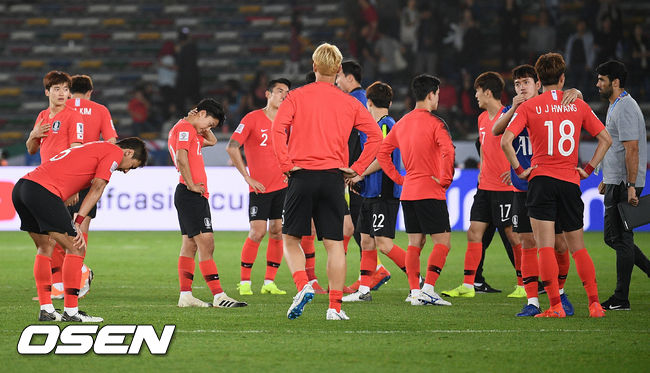
On January 26, Korean “Chosun Ilbo” introduced the article by Japanese media “Football channel” with the title “Japanese media severely criticizes” as follows. “Korea was defeated by Qatar and finished to final eight. The dream of championship was not realized this time either after an interval of 59 years. The Korean national team went to final eight by the hard games in succession in the same way as the Japanese team. In the quarterfinals, Korea did extra time even against Bahrain and ran for 120 minutes. After that Korea took 2 days rest and had the quarterfinals. However, it was same as Bahrain that defeated Iraq and took 2days rest. In the early stages, Korea mainly possessed the ball, but it was not able to threaten the Qatari goal in earnest and Korea finished the first half a little carefully. In the latter half, the Qatari goal keeper did fine save at the shot of Hwang Ui-Jo. And at 32 minutes in the latter half the free kick of Kim Jin-Su who had played in Niigata hit the right post. At 34 minutes in the latter half, Qatar succeeded in a score by a Hatem’ shot from distance. Korea shook the goal net immediately by a Hwang Ui-Jo’s shot, but it was canceled in a judgment of the offside. VAR judgment was No-goal too. Qatar advanced to the semifinal. On the other hand, Korea without championship since 1960 failed in the conquest of Asia this time too. Korea could not advance to even the semifinals in four recent games for the first time.” |
My Opinion
|

On the issue that Korea insists that a Korean warship boat received “the threatening flight” from patrol aircraft of Japanese Marine Self Defense Force, Takeshi Iwaya Japanese Minister of Defense said about the photograph that the Korea Department of Defense showed on 24th, “There is neither the intention nor the reason that our patrol aircraft gives Korea war vessel a menace”. He repeatedly denied the claim of the Korean side. He argued against the Korean claim. “Theirs is a warship, ours is a patrol aircraft. It is rather a patrol aircraft to feel a menace.” And he said, “I want Korea to accept two countries make the future oriented relation with each other as the nations that take responsibility for this area jointly”. He demanded the calming of the situation and showed his thought that he would stop the new announcement such as flight records. |
My Opinion
|

Davos, Switzerland, Jan. 23 (Jiji Press)--Japanese Foreign Minister Taro Kono engaged in a bitter war of words with his South Korean counterpart, Kang Kyung-wha, on Wednesday over what Seoul claims is a “threatening flight" by a Japanese patrol plane near a South Korean warship. At their meeting in the Swiss resort of Davos, Kang told Kono that she is concerned over the flight by the Japanese Maritime Self-Defense Force plane, saying that the incident was regrettable. In response, Kono denied that the P-3C aircraft flew near the South Korean warship. The South Korean announcement was regrettable, he said. Still, Kono and Kang agreed on the importance of close communication between the two countries' diplomatic authorities. According to the announcement by South Korea's Ministry of National Defense on Wednesday, the incident occurred on the same day near Ieodo, a reef located south of South Korea's Jeju Island. The ministry said that the low-altitude, close-range flight was an obvious act of provocation. |
My Opinion
|

A South Korean court summoned a former chief justice on Wednesday to determine whether to issue a warrant for his arrest as requested by prosecutors over his alleged abuse of power during the previous administration of President Park Geun Hye. Yang Sung Tae, who was the country's Supreme Court chief from 2011 to 2017, is alleged to have misused his position to lobby the Park administration for the establishment of a new appeals court. He is also accused of purposely delaying a top court ruling on a controversial wartime forced labor case involving a Japanese firm at a time when the Park administration sought friendly ties with Japan. Yang has denied any wrongdoing, according to media reports. He entered the Seoul Central District Court shortly before 10:30 a.m. The court is expected to reach a decision sometime between Wednesday night and early Thursday. Yang was questioned by prosecutors several times earlier this month before they requested an arrest warrant from the court on Friday. He is the first former chief justice to be interrogated by prosecutors as a suspect. The Supreme Court eventually ruled on the wartime labor case in October, upholding a lower court ruling that ordered Nippon Steel & Sumitomo Metal Corp. to pay four South Korean plaintiffs 100 million won ($88,000) each in compensation for forced labor. The decision and subsequent rulings against Japanese firms in South Korean courts over similar wartime labor cases have drawn criticism from the Japanese government, chilling ties between the two countries. |
My Opinion
|


The Defense Ministry on Jan. 21 released a ‘final’ statement on a December incident in which a South Korean destroyer allegedly targeted a Japanese patrol aircraft with fire-control radar in the Sea of Japan, effectively terminating its discussions with Seoul on the matter. The ministry also made public on its website what it says is the data of the radar waves converted to sound (Warning: high-pitched sounds) that the crew on the Japanese Maritime Self-Defense Force (MSDF) P-1 patrol plane heard on Dec. 20 during the radar lock-on incident. The data was presented by Japanese officials to South Korean officials in a meeting on Jan. 14 in Singapore and the Japanese side proposed to them to listen to it there but the proposal was turned down, the ministry stated. The ministry said in the statement, written in English, Japanese and Korean, “careful and meticulous analysis” by its specialized unit confirmed that the P-1 aircraft was targeted multiple times by the South Korean destroyer’s STIR-180 fire-control radar. The statement said that such an action is considered a “simulation of an attack” that a commander might avoid under the 2014 Code for Unplanned Encounters at Sea, which was adopted by navies from 21 countries including Japan and South Korea. Because of South Korea’s repeated denial of facts and joint verification, the ministry said, “it is unlikely that the truth will ever be made clear even if working-level meetings were to continue.” The ministry, therefore, “deems that it has become difficult to continue to hold discussions” with Seoul on the matter. The ministry urged South Korea to accept that the radar incident did occur and take measures to avoid a recurrence. Meanwhile, the ministry stated that its stance is unchanged that defense cooperation between Japan, South Korea and the United States is “extremely important” and “indispensable” in facing North Korean nuclear and missile threats and it will continue to make efforts to maintain the cooperative relationship. South Korea’s Ministry of National Defense on Jan. 4 released a video presentation it claimed showed the P-1 patrol plane flying on Dec. 20. The release followed footage Japan unveiled on Dec. 28 that Tokyo says shows the lock-on incident and that the P-1 crew was flying by the book. Seoul has denied the destroyer used the radar, and demanded an apology from Japan for having the plane fly low over the warship. |
My Opinion
|
 Bridge 月精 (월정교) reconstructed (upper)
Bridge 月精 (월정교) reconstructed (upper) and bridge 回龍 (회룡교) in Hunan, China (below) The point at issue is bridge “月精”. It is the bridge that Gyeongju city used an enormous sum of 51 billion won (approximately 50 million dollars) to reconstruct. Though the bridge pier should be an arched form by the poetry that a writer in Korai Era (918-1392) left, the reconstructed bridge is linear. Furthermore, it resembles bridge 回龍 that is in Hunan, China and was built in the 18th century. The bridge after the reconstruction is like the location for making a movie. It is made magnificently as possible to attract more tourists. The literal materials were ignored in the reconstruction. |
My Opinion
|
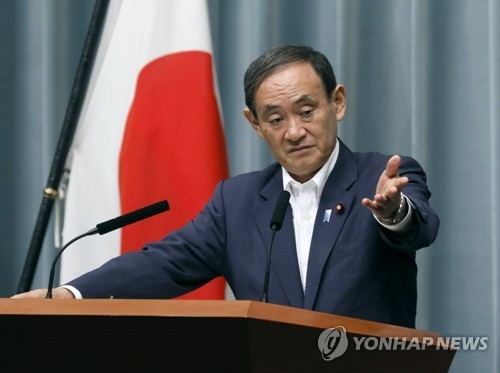
Yoshihide Suga, Japanese Chief Cabinet Secretary criticized the Korean President Moon Jae-in. He said, “I want to make it sure that what the Korean President said is different from the international law”. On January 16, Secretary Suga commented about the judgment of the Korean Supreme Court concerning so-called conscripted Workers. “It is a large principle of the international law that the whole organs of the countries concerned, namely administration, judiciary and legislation must obey the contents which they agreed in a treaty. ” The remark of Secretary Suga directly criticized the remark that Korean President Moon spoke at the press conference in the New Year on 10th. In addition, he insisted “It is natural for any countries to obey what they agreed, and of course the judicial branch is included in it. Any country must not do an action that denied a large principle of the international law. ”. On 10th, Moon said in the interview, “The government can not be implicated in the judgment of the judicial branch by separation of threes powers of administration”. Secretary Suga answered, “It is a wrong claim. It is the large principle of the international law that the treaty is superior to the laws and the judicial judgements”. |
My Opinion
|
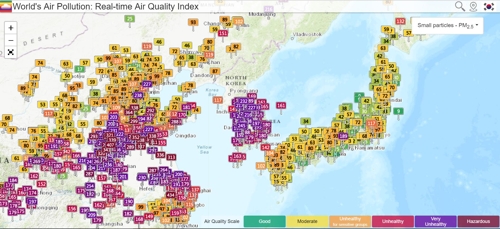
While Korea and China are suffering from PM 2.5; particulate matter 2.5; particles smaller than 2.5 micrometers, it was revealed that the adjacent Japanese atmospheric quality was superior. By the air quality index (AQI) that the U. S. Environmental Protection Agency (EPA) announced, Korea as of 9:00 a.m. on January 15 recorded around 200 generally.
In China at the same time, many areas recorded more than 400, although it varied in districts because China was large. On the other hand, Japan was less than 100 generally, and there were many areas that recorded “good”, less than 50. When you see annual average, Japan’s PM2. 5 density is much lower than Korea or China. It’s because Japan is farther away from China than Korea. China is the main cause of PM2.5. So Japan receives relatively a little influence from the Chinese air pollution materials. |
My Opinion
|
|
The many Japanese fruits flow out abroad. It was the Japanese kind’s mandarin orange that was produced without permission in Korea again. It is the problem that the fruits of the Japanese kind such as Shine Muscat (high-quality grape) and strawberry flow out into Korea in succession. In Jeju Island in Korea, the Japanese mandarin oranges are produced without permission. This time the Japanese side stopped it. While Jeju Island is known as a resort area, it is also known as the Korean maximum production center of the mandarin orange. In fact, the mandarin oranges made in this island are mostly the kinds that flew out from Japan. Furthermore, some kinds are without permission. They can do as they please. The new kind “Mihaya” has been produced without permission. It was registered in Japan in 2014. “Mihaya” is characterized by the reddish skin, the modest acidity and the high sugar content. The National Agriculture and Food Research Organization (NARO) has developed it for 16 years. It is literally the fruit of NARO’s labor. Though “Mihaya” is a new kind and is hardly in circulation in Japan, it already bears heavy fruits in the mandarin orange farmhouses in Jeju Island. However, the shipment of the mandarin orange produced without permission suddenly stops. This shipment stop happens also in the Korean farmhouses that produce “Asumi” without permission. “Asumi” is the kind that Japan took 22 years for its development. Until now Shine Muscat and brand strawberry have been produced in Korea without permission in the same way. Japan had no choice but to let it drop. In fact, it must be less than six years after a Japanese starts to sell the new kind of fruit trees in Japan to register it abroad. Japan’s NARO applied for the registration of “Mihaya” and “Asumi” to the Korea government in January, 2018. It was within the time limit. The selling of two kinds is to be prohibited in Korea, while the examination is carried out. |
My Opinion
|
An informant: Only the bottles of the pesticide drift strangely…. A liquid comes out…. Because this is absolutely deadly poison, …. People catch fish commonly in this neighborhood…. Keiji Yamamoto, chief of recycling city promotion section in Matsue city: “If it explodes when children play, it becomes danger and the injured persons appear ….” Even if we municipalities say that, it is not improved. We feel slightly irritated…. FNN asked the Korean Department of Defense whether there is the fact that it dumped garbage, but there is no answer currently. |
My Opinion
|
|
The South Korean Ministry of National Defense on Jan. 4 released a video rebutting Japan’s claim that a South Korean destroyer used fire control radar on a Japanese Maritime Self Defense Force (MSDF) P-1 patrol plane over the Sea of Japan on Dec. 20 last year. The 4 minute, 27 second-long footage has been posted to YouTube. Tokyo has criticized the incident as dangerous, saying the use of the radar usually comes right before an attack. On Dec. 28, the Japanese Ministry of Defense released video footage it says shows the lock-on incident and that the MSDF P-1 crew was flying by the book. Seoul has denied the destroyer used the radar, and demanded an apology from Tokyo for having the plane fly low over the ship. |
My Opinion
|

Fifi, a TV personality revealed that she had been advised about the cosmetic surgery of her face in Korea, and she spelled her thought, “That is sad”. Fifi updated her Twitter on 1st January. She said, “I don’t think all the Korean people think so, but they have the big facial inferiority complex and the big racial inferiority complex. It is truly pitiful.” “I was advised in Korea ‘Your face should have orthopedic treatment’. And I was explained ‘In this country looks are all’”. She spelt her own experience. She grieved “It is sad and poor society”. And she spelt “I’m glad Japanese people don’t say such a thing at least”. |
My Opinion
|